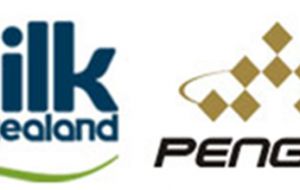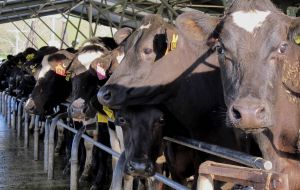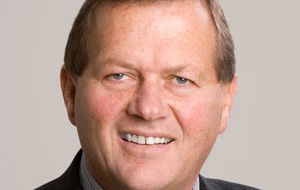MercoPress. South Atlantic News Agency
New Zealand rejects controversial sale of iconic dairy farm to Chinese company
 Food giant Shanghai Pengxin Group has bought 29 farms through local subsidiaries to become New Zealand's third largest dairy producer
Food giant Shanghai Pengxin Group has bought 29 farms through local subsidiaries to become New Zealand's third largest dairy producer  New Zealand is the world's largest dairy producer, exporting 95% of its production, and China the largest foreign investor in the country's dairy sector
New Zealand is the world's largest dairy producer, exporting 95% of its production, and China the largest foreign investor in the country's dairy sector  Colin Armer, shareholder in Fonterra - the world's biggest dairy exporter - and top producer Dairy Holdings, says he welcomes the competition from Pengxin.
Colin Armer, shareholder in Fonterra - the world's biggest dairy exporter - and top producer Dairy Holdings, says he welcomes the competition from Pengxin. Chinese conglomerate Shanghai Pengxin Group has been on a buying spree ever since it entered New Zealand in 2011. The food giant has bought 29 farms through local subsidiaries to become the country's third largest dairy producer.
Pengxin's expansion plans in New Zealand seemed to be going smoothly until last month when the government unexpectedly rejected its 56m bid to buy the sprawling and iconic Lochinver farm.
The move came as a big surprise, considering the sale had been approved by the country's foreign investment body. Now, Pengxin has pulled the plug on another deal to buy a group of farms 3,300 hectares in size, saying it was “not confident” of approval from the government, considering its last experience.
It is also taking the government's decision to block its purchase of Lochinver to court, seeking a judicial review. Terry Lee, director of Milk New Zealand - a subsidiary of Pengxin - says the aim of the legal action is to get “clarity” on the requirement used to assess the sale of farmland bigger than five hectares to foreign buyers.
”Judgment has to be made as to whether the status quo applies (that is, ownership remains with the current owners), or alternately that the property would have been sold anyway to a well-funded and competent New Zealander,“ he said in a statement earlier this month.
A big Chinese investor backtracking on purchase plans amid slumping commodity prices could not have come at a worse time for some of New Zealand's dairy farmers. Dairy prices have fallen more than 50% since February, hitting the economy hard.
New Zealand is the world's largest dairy producer, exporting 95% of its production, and its central bank has had to cut interest rates three times this year, partly to stem the fallout from tumbling prices.
Also, China is the largest foreign investor in the country's dairy sector, according to the New Zealand China Council.
Colin Armer, who is one of New Zealand's largest dairy investors and has been in the farming business for 35 years, says Pengxin's decision to cancel a deal to buy more farms may have an impact on owners looking to sell their farms because of falling prices.
”I think long term owners of land are entitled to sell it to the best price they can get and if there's public belief that those owners should take a lesser price, than they should be putting their own hands in their pocket really,“ he told the BBC.
Armer, who is a shareholder in Fonterra - the world's biggest dairy exporter - and top producer Dairy Holdings, says he welcomes the competition from Pengxin.
”Bring it on. Foreign investment is great for New Zealand - it's needed,“ he says. ”I hope they do well - I hope New Zealand does well out of it as well.“
But not all farmers are as enthusiastic about how rapidly the Chinese firm's business has grown in the country in such a short period of time.
Dr William Rolleston, president of the Federated Farmers of New Zealand, a group that lobbies on behalf of its farmer members, says some farmers are concerned about the scale of the purchases.
”New Zealanders don't have an issue on ownership at a low level. No one would be concerned if 5% of farmland was owned by overseas buyers,“ he says.
”But if 95% of the land in New Zealand was owned by overseas buyers, I think we would have an issue - it would reduce our strategic options in the future.“
Dr Rolleston's sentiment echoes public concern from 2012 when Pengxin bought 16 dairy farms and sparked a debate about national identity.
During the last elections in 2014, opposition politicians stoked those fears by saying that New Zealanders risked becoming ”tenants in their own land”.




Top Comments
Disclaimer & comment rules-

-

Read all commentsGood on you NZ.
Oct 30th, 2015 - 12:59 pm 0Good, about time they go back to smaller farms and let the real farmers buy farms, not corporate conglomerates.
Oct 30th, 2015 - 04:09 pm 0Commenting for this story is now closed.
If you have a Facebook account, become a fan and comment on our Facebook Page!